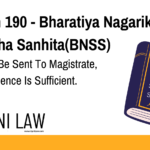Code:
(1) When the case is of the nature referred to in clause (i) or clause (ii) of
sub-section (3) of section 194, the nearest Magistrate empowered to hold inquests shall,
and in any other case mentioned in sub-section (1) of section 194, any Magistrate so
empowered may hold an inquiry into the cause of death either instead of, or in addition to,
the investigation held by the police officer; and if he does so, he shall have all the powers
in conducting it which he would have in holding an inquiry into an offence.
(2) Where,—
(a) any person dies or disappears; or
(b) rape is alleged to have been committed on any woman,
while such person or woman is in the custody of the police or in any other custody authorised by the Magistrate or the Court, under this Sanhita in addition to the inquiry or investigation
held by the police, an inquiry shall be held by the Magistrate within whose local jurisdiction
the offence has been committed.
(3) The Magistrate holding such an inquiry shall record the evidence taken by him in
connection therewith in any manner hereinafter specified according to the circumstances of
the case.
(4) Whenever such Magistrate considers it expedient to make an examination of the
dead body of any person who has been already interred, in order to discover the cause of
his death, the Magistrate may cause the body to be disinterred and examined.
(5) Where an inquiry is to be held under this section, the Magistrate shall, wherever
practicable, inform the relatives of the deceased whose names and addresses are known,
and shall allow them to remain present at the inquiry.
(6) The Magistrate or the Executive Magistrate or the police officer holding an inquiry
or investigation under sub-section (2) shall, within twenty-four hours of the death of a
person, forward the body with a view to its being examined to the nearest Civil Surgeon or
other qualified medical person appointed in this behalf by the State Government, unless it
is not possible to do so for reasons to be recorded in writing.
Explanation.—In this section, the expression “relative” means parents, children,
brothers, sisters and spouse.
Explanation:
(1) Section 196 of the BNSS deals with the inquiry into the cause of death in certain circumstances.
(2) It outlines the procedure for conducting an inquiry by a Magistrate, particularly when a person dies or disappears while in police custody or other authorized custody. This section ensures a thorough investigation to ascertain the cause of death and prevent potential abuse of power.
(3) The Magistrate conducting an inquiry must record the evidence collected during the process in a manner that suits the specific circumstances of the case. This ensures that all relevant information is documented accurately, which is crucial for the legal proceedings.
(4) When a Magistrate believes it is necessary to examine the body of a person who has already been buried to determine the cause of death, they can order the body to be disinterred for examination.
(5) If an inquiry is conducted, the Magistrate will inform the deceased’s known relatives and allow them to attend the inquiry whenever possible.
(6) Additionally, the Magistrate, Executive Magistrate, or police officer conducting the inquiry must send the body to the nearest Civil Surgeon or qualified medical professional for examination within twenty-four hours of the person’s death, unless there are valid reasons preventing this, which must be documented in writing. This process ensures thorough investigation and transparency in cases of suspicious deaths.
Illustrations:
Case 1: A person dies in police custody. In this case, a Judicial Magistrate will conduct an inquiry into the cause of death, in addition to the police investigation.
Case 2: A woman alleges rape while in police custody. Here, a Judicial Magistrate will hold an inquiry into the allegations of rape, supplementing the police investigation.
Common Questions and Answers:
Q: When is a Magistrate required to hold an inquiry into the cause of death?
A: A Magistrate is required to hold an inquiry when a person dies or disappears while in police custody or other authorized custody. This includes cases where rape is alleged to have been committed on a woman in such custody.
Q: What powers does a Magistrate have during the inquiry?
A: The Magistrate has all the powers in conducting the inquiry that they would have in holding an inquiry into an offence. This includes summoning witnesses, collecting evidence, and examining the scene of the incident.
Q: What happens to the body of the deceased after the inquiry?
A: The body is forwarded to a Civil Surgeon or other qualified medical person for examination within 24 hours of death, unless it is impossible to do so.
Q: Can the body be exhumed for further examination?
A: Yes, if the Magistrate considers it necessary to discover the cause of death, they can order the body to be exhumed and examined.
Q: Who can be present during the inquiry?
A: The Magistrate shall inform the relatives of the deceased and allow them to be present at the inquiry.








